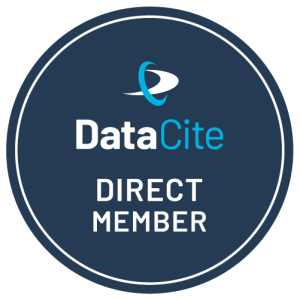 A DOI is an acronym for “digital object identifier”. DOIs are a type of Persistent Identifiers (PID) that uniquely identifies digital reserch content. They are intended to be a permanent way of identifying and accessing a particular resource.
A DOI is an acronym for “digital object identifier”. DOIs are a type of Persistent Identifiers (PID) that uniquely identifies digital reserch content. They are intended to be a permanent way of identifying and accessing a particular resource.
AFRIScholar partners with DataCite to provide DOI to digital resources.
DataCite is a leading global, non-profit organization that provides persistent identifiers (specially DOIs) for research data and other research output. Using DOI from DataCite comes a lot of features. Some of such features includes:
1. DataCite DOI makes research data and other output discoverable and citable
2. Datacite Search is used by Google Dataset Search to index all research data with a DaCite DOI. This means if a DataCite DOI is register for a research data, it will automatically appear in Google Dataset Search, thereby reaching a wider audience.
3. DataCite metadata are also harvested by organizations such are OpenAIRE and Clarivate’s Data Citation index.
4. DataCite used highly interoperable metadata schema called DataCite Metadata Schema 4.4 to promote the visibility of your outputs.
5. DataCite comes with access to metrics and reserch output impact. Some metrics that can be checked includes:
– Works impact
– Institution’s impact
– Number of Citations
– Number of Views
– Number of downloads
Benefits of a DOI
A DOI (Digital Object Identifier) offers several benefits, particularly in academic and scholarly contexts:
1. Persistent Identification: DOIs provide a permanent and unique identifier for digital object s such as academic papers, datasets, and other scholarly works. Unlike URLs, which can change over time, DOIs remain stable, ensuring that the content can always be found and accessed.
2. Citation Tracking: DOIs facilitate accurate citation tracking and referencing, both for authors and researchers. They provide a standardized way to cite digital objects, ensuring that citations remain valid and linkable over time.
3. Accessibility: DOIs improve the accessibility of scholarly content by providing a consistent and reliable means of locating and accessing digital objects, regardless of changes in web addresses or hosting platforms.
4. Interoperability: DOIs are widely recognized and supported across different systems and platforms. This interoperability ensures that digital objects can be seamlessly integrated into various scholarly workflows, databases, and publishing platforms.
5. Metrics and Analytics: DOIs enable the tracking of usage metrics and other forms of impact assessment for digital objects. This includes metrics such as downloads, citations, and mentions in social media, which can be valuable for assessing the reach and influence of scholarly works.
6. Credit and Attribution: DOIs help to ensure proper credit and attribution for authors and creators of digital objects. By providing a persistent identifier, DOIs make it easier to track and acknowledge the contributions of individual scholars and researchers.
7. Preservation: DOIs can be associated with digital preservation initiatives, ensuring that scholarly content remains accessible and usable over the long term. This is particularly important for preserving the scholarly record and ensuring the integrity of research findings.
Overall, DOIs play a crucial role in enhancing the discoverability, accessibility, and impact of scholarly content in the digital age. They provide a standardized and persistent means of identifying and referencing digital objects, benefiting both creators and consumers of scholarly
knowledge
Please Select your category Below:
![]() Downloads
Downloads






